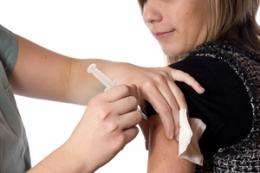Unaccompanied teens often unable to get needed vaccines

Health care providers report that older teens often go to the doctor without a parent or guardian, a new survey in the Journal of Adolescent Health reveals—and those teens may not get necessary vaccinations because there's no parent or guardian present to give consent.
"Twelve-year-old adolescents never or rarely present for healthcare without a parent or guardian," says Carol Ford, M.D., lead author of the study and chief of adolescent medicine at the Children's Hospital of Philadelphia. "It's really as teenagers get older that they are more likely to present to clinic settings alone."
Ford and colleagues surveyed 263 health care professionals who had experience with adolescent vaccinations. Nearly half reported that 17-year-old patients often or sometimes show up unaccompanied for routine check-ups. About 30 to 50 percent of clinicians said even if these teens were found to be eligible for human papilloma virus (HPV), influenza, or the tetanus-diptheria-pertussis (Tdap) vaccine, they would not receive those vaccines if a parent wasn't present to give consent.
Older teens may be asked by working parents to attend appointments alone or teens may seek confidential services related to sexual behavior, say the researchers.
In addition, most of the health care professionals surveyed supported giving minors the ability to self-consent at age 14. Currently, minor consent varies by state law and types of services received.
"We should be considering creative strategies to allow opportunities for parents to consent for vaccines in advance or at a distance when they are not physically present in clinics," Ford says. For example, parents could give consent for the 3-vaccine series for HPV when the first one is administered, or parents could be contacted via text messaging while the teen is at the clinic.
Angela Diaz, M.D., director of the Mount Sinai Adolescent Health Center, says that in her opinion any adolescent, regardless of age, who is receiving confidential healthcare services, should be allowed to give minor consent for all vaccines, but particularly for the vaccines to prevent HPV and hepatitis B, which are sexually transmitted.
"By 9th grade, 33 percent of kids are having vaginal intercourse, and by 12th grade its 63 percent," Diaz says. "If you can administer these vaccines before they become sexually active or very early, all the better." The HPV vaccine can prevent two-thirds of all cervical cancers, and the hepatitis B vaccine can prevent infection and liver cancers associated with hepatitis B.
"What we want is for the kids to be protected, so we have better outcomes. Teens are trying to do the right thing by getting services," Diaz says. "We have these tools that have been shown to be effective, so why not help them do that?"
More information: Ford CA, Skiles MP, English A, et al. Minor consent and delivery of adolescent vaccines, J Adol Health, 2013.

















